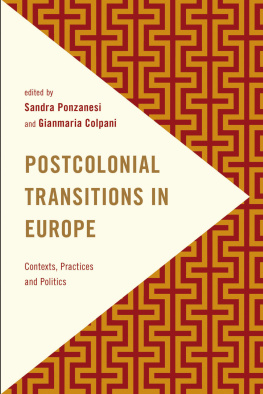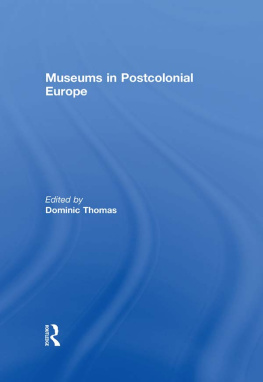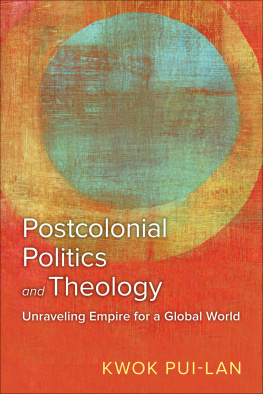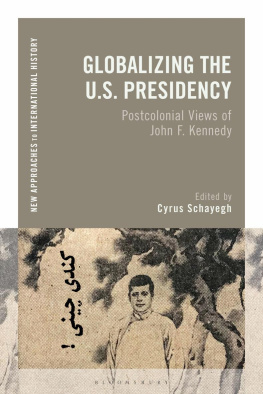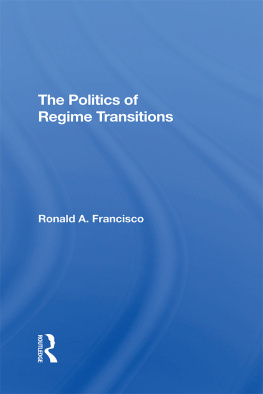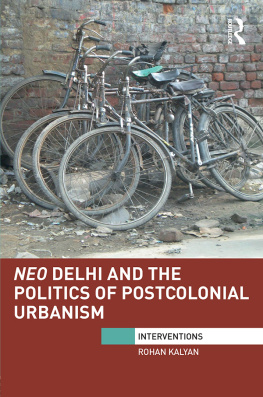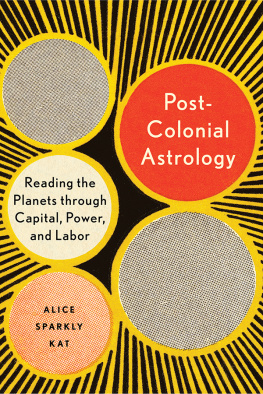Postcolonial Transitions in Europe
Frontiers of the Political
Series Editor: Engin Isin, Professor of Politics, The Open University, UK
The Frontiers of the Political series contributes to our understanding of transversal political struggles beyond and across the borders of the nation-state, which have become influential and effective means of both contentious politics and political subjectivity. It features titles that eschew and even disavow interpreting these transversal political struggles with categories and concepts of political thought that originally arose from the contained and container politics of the nation-state. Books in the series investigate habitus, practices, and acts that define new frontiers of political subjectivity, engaging particularly with indigeneity, diasporicity, the human body, cyberspace, war, and earth. These sites are understood as political sites of struggle and traverse already existing borders, but constitute emergent frontiers of political subjectivity. The investigations of political subjectivitymechanisms through which individuals or collectivities inhabit positions in social space for articulating collective rightsare, as ever, amongst the most vital questions of our age.
Postcolonial Transitions in Europe , edited by Sandra Ponzanesi and Gianmaria Colpani
Postcolonial Transitions in Europe
Contexts, Practices and Politics
Edited by
Sandra Ponzanesi and
Gianmaria Colpani
London New York
Published by Rowman & Littlefield International Ltd
Unit A, Whitacre Mews, 26-34 Stannary Street, London SE11 4AB
www.rowmaninternational.com
Rowman & Littlefield International Ltd. is an affiliate of Rowman & Littlefield
4501 Forbes Boulevard, Suite 200, Lanham, Maryland 20706, USA
With additional offices in Boulder, New York, Toronto (Canada), and Plymouth (UK)
www.rowman.com
Copyright 2016 by Sandra Ponzanesi and Gianmaria Colpani
All rights reserved . No part of this book may be reproduced in any form or by any electronic or mechanical means, including information storage and retrieval systems, without written permission from the publisher, except by a reviewer who may quote passages in a review.
British Library Cataloguing in Publication Data
A catalogue record for this book is available from the British Library
ISBN: HB 978-1-78348-446-1
PB 978-1-78348-445-4
Library of Congress Cataloging-in-Publication Data
Names: Ponzanesi, Sandra, 1967 | Colpani, Gianmaria.
Title: Postcolonial transitions in Europe : contexts, practices and politics / edited by Sandra Ponzanesi and Gianmaria Colpani.
Description: London : Rowman & Littlefield International, 2016. | Series: Frontiers of the political | Includes bibliographical references and index.
Identifiers: LCCN 2015037397 | ISBN 9781783484454 (cloth : alk. paper) | ISBN 9781783484461 (pbk. : alk. paper) | ISBN 9781783484478 (electronic)
Subjects: LCSH: PostcolonialismEurope. | Social changeEurope. | EuropeColoniesHistory. | EuropePolitics and government1989 | ImmigrantsEuropeSocial conditions. | MulticulturalismEurope. | CosmopolitanismEurope. | ImperialismSocial aspectsEurope. | EuropeEthnic relations. | EuropeSocial conditions.
Classification: LCC JV105 .P67 2016 | DDC 325/.3094dc23 LC record available at http://lccn.loc.gov/2015037397

The paper used in this publication meets the minimum requirements of American National Standard for Information SciencesPermanence of Paper for Printed Library Materials, ANSI/NISO Z39.48-1992.
Printed in the United States of America
Contents
Paul Gilroy
Gianmaria Colpani and Sandra Ponzanesi
Anca Parvulescu
Peo Hansen and Stefan Jonsson
Mireille Rosello
Sarah Fekadu-Uthoff
Christine Quinan
Rasa Navickait
Sabrina Marchetti
Nick Dines and Enrica Rigo
Annalisa Oboe
Brigitte Hipfl
Milica Trakilovi
Bolette B. Blaagaard
Koen Leurs
Eva Midden
Nicholas Boston
Anik Imre
Monica Sassatelli
Dirk Gttsche
Feyzi Baban
We would like to thank the NWO (Netherlands Organization for Scientific Research) for having financed the international research project PEN (Postcolonial Europe Network), which has allowed scholars from different locations and disciplinary backgrounds to come together to rethink Europe from a postcolonial perspective. This book draws inspiration from one of our international meetings, entitled Postcolonial Transitions in Europe : Conflict, Transitional Justice and Cosmopolitanism , held in Utrecht, the Netherlands, June 1819 of 2013. We would like to thank our PENs international partners, in particular Graham Huggan, Paulo de Medeiros, Lars Jensen, and Tobias Doering.
Also, a special word of thanks to the many guests and memorable keynote speakers, ranging from tienne Balibar, to Zygmunt Bauman, Paul Gilroy, Dipesh Chakrabarty, Bruce Robbins, Robert Young, Gurminder Bhambra, Rosemarie Buikema, Neil Lazarus, Elizabeth Deloughrey, and many others.
In particular, we would like to thank Whitney Stark and Laura Candidatu for their careful and dedicated support throughout the final editorial phase.
Europe Otherwise
Paul Gilroy
The enduring effects of Europes colonial history have never been more deeply or disastrously inscribed upon its post-Cold War, post- and neocolonial present. The aftershocks of that departed period of global preeminence are still being registered both directly and obliquely in contemporary European culture. The decaying reverberations are, for example, palpable in the ultranationalism and xenological racism that animate Europes various manifestations of neo-fascism. Resentful, angry voices are shouting loudlythough not yet overwhelminglyin different languages and from several directions simultaneously. The same residues condition the ways in which discussion of immigration is routinely thematized and organized by the entangled assumptions of racial and cultural hierarchy. This can be true even if the unwanted settlers who are to be excluded, criminalized, and reviled, can, like migrants from the formerly communist countries, be included in the unstable world of whiteness.
Europes undigested colonial history remains at stake in the influential interpretative framework provided by the idea of a clash of civilizations. That totalizing formulation is now the master trope of contemporary political culture. It yields frames that have been deployed to explain everything from the counterinsurgency warfare in Mesopotamia, Syria, Somalia, Nigeria, Libya, and Afghanistan to the conflicts over gender equality, LGBT rights, faith, and belief discovered at home and abroad. It functions just as Samuel Huntington, its old, cold warrior architect, had hoped that it would. Yet the iron curtain of ideology has not been replaced by the velvet curtain of culture as he predicted. Those categories have merged, fused, and assumed complex, novel configurations even as the effort deployed to differentiate them was diverted so that it would comfortably reaffirm the inevitability of conflict and the immutability of difference.
I can hear the muttered objections to these sweeping statements start to rise into a menacing rumble. Presumably, the objectors will say that colonial misrule is long past and that its effects were nothing when compared to the social and cultural pathologies of the still developing world, which, contrary to the assumptions of political correctness, thrived in the firm grip of European domination. They will insist that these unpleasant issues were only ever of concern to the few European states that enjoyed a major imperial phase. Questions of race and racism will then be dismissed as essentially unimportant considerationsnothing more than a dubious, unwanted export from the United States broken polity. And, now that were being told the post-9/11 wars are essentially over and done with, we can anticipate the restoration of sweetness and light behind the high fortifications of Schengen and Project Frontex. This gem of an anthology explains patiently why all of those knee-jerk responses are utterly mistaken. It demonstrates why a broadly conceived postcolonial approach is essential to the rehabilitation and restoration of European democracy menaced by the epiphany of new fascisms. Primo Levis wise words establish a useful beginning for a survey of present conditions:

 The paper used in this publication meets the minimum requirements of American National Standard for Information SciencesPermanence of Paper for Printed Library Materials, ANSI/NISO Z39.48-1992.
The paper used in this publication meets the minimum requirements of American National Standard for Information SciencesPermanence of Paper for Printed Library Materials, ANSI/NISO Z39.48-1992.
